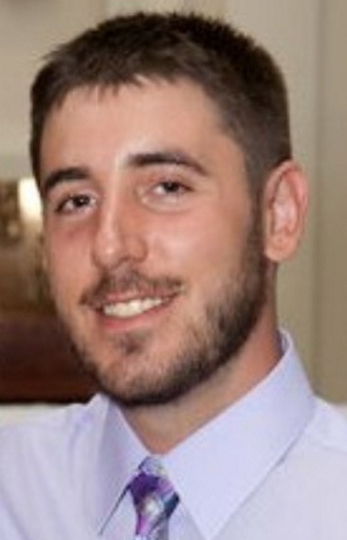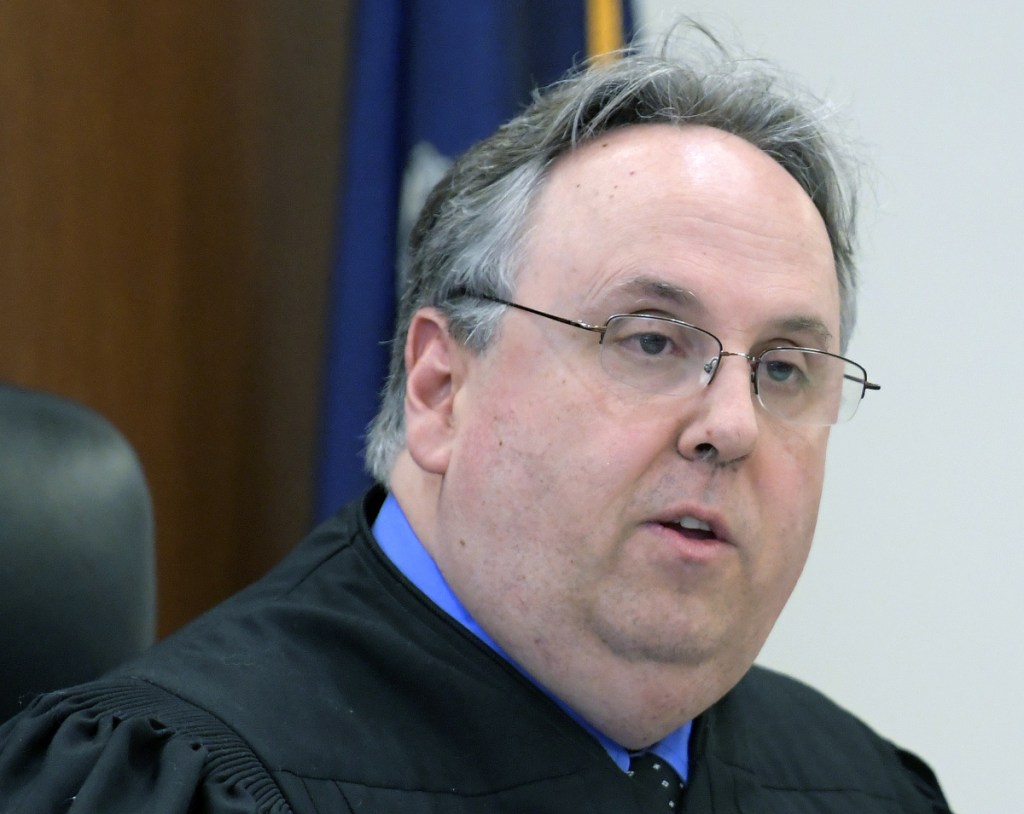
Aubrey N. Armstrong, left, of Far Rockaway, New York, was convicted Wednesday of felony murder and robbery in the Nov. 23, 2015, drug-related bludgeoning death of Joseph Marceau of Augusta.
AUGUSTA — Aubrey N. Armstrong was complicit in the drug-related killing and robbery of Joseph Marceau of Augusta, but there wasn’t enough evidence to convict him of personally carrying out the murder.
That was the finding Wednesday of a judge who cleared 29-year-old Armstrong of Far Rockaway, New York, of a murder charge but convicted him of felony murder and robbery, two crimes that each carry maximum sentences of 30 years.
Armstrong, also known by the street names of “Acon” and “Butter,” remained stoic-faced as the verdict was read by Justice Daniel Billings.
“I think he was in a state of shock,” Armstrong’s attorney, Brad Grant, said after the hearing of his client, “having sat through the testimony of Michael McQuade and recognizing that what he had to say didn’t add up with the other evidence.”
Armstrong was one of four people accused of murder, felony murder and robbery in the Nov. 23, 2015, drug-related bludgeoning death of Joseph Marceau of Augusta. Two co-defendants, Michael “Dirty” McQuade and Damik “Doughboy” Davis, pleaded guilty to felony murder and robbery charges and are awaiting sentencing. McQuade took the stand during the trial to testify that he saw Armstrong beat Marceau to death over drugs.
Under Maine law, a person is guilty of felony murder if acting alone or with others persons, commits or attempts to commit a felony — murder, robbery, burglary, kidnapping, arson, gross sexual assault, or escape — and this causes the death of another person.
A sentencing hearing will be held later. Armstrong pleaded not guilty and opted for a non-jury trial that took place over five days at the Capital Judicial Center in Augusta. The fourth defendant, Zina Fritze, 27 of Augusta, who was McQuade’s girlfriend, hanged herself in jail a day after pleading not guilty to the charges.
Armstrong did not testify at the trial, and witnesses from the Maine State Police Crime Laboratory testified that his DNA was not found on any items taken from apartment 8 at 75 Washington St., Augusta, where Marceau’s body was discovered.
However, Fritze’s DNA was found on the rear pocket of pants Marceau was wearing.
Grant, Armstrong’s attorney, has suggested that the fatal beating was done by Fritze and Davis and that Armstrong and McQuade were not present.
However, in issuing his verdict regarding what he termed “a horrific and brutal murder,” Billings said there was enough evidence from witnesses to find that Armstrong was at the murder scene and participated in the robbery. He cited testimony of two women — who had been given immunity from prosecution — who described Fritze, McQuade and Armstrong climbing into the women’s apartment through a fire escape window as emergency vehicles responded to the crime scene.
“That is very strong evidence that Mr. Armstrong had been at the scene of the crime along with Ms. Fritze and Mr. McQuade,” Billings said.
As Billings gave his verdict, about 20 members of Marceau’s family and friends watched from the public area benches as did a dozen or so law enforcement officers. Marceau’s family indicated they were did not want to speak to a reporter immediately afterward.
After the verdict, Grant said, “We appreciate the court taking the time to review everything carefully. Although we believe we provided reasonable doubt on the other counts, we nonetheless respect the work of the court and Justice Billings.”
Two interpreters have translated between Guyanese Creole and English for Armstrong, who is not a citizen but who is legally in the United States, according to Grant. It is unclear whether Armstrong is from Guyana, a South American country near the Caribbean.
One of the prosecutors, Assistant Attorney General John Alsop, said, “We are disappointed because we felt we proved a case of murder. There’s no doubt in our minds that he’s guilty of murder.”
Billings commented on the credibility — and lack thereof — of some witnesses, and Alsop said, “The witnesses to this type of crime are going to have some baggage and we recognize that.”
On the night of the murder, Davis answered the apartment door when police arrived in response to noise complaints made by neighbors.
Augusta officers described Davis as sweating and gasping for breath, and said they saw a slim figure in a dark sweatshirt with the hood up pass behind Davis as they talked to him. Davis fled and was arrested shortly afterward outside the building.
McQuade took the witness stand and said that Armstrong started the vicious attack, striking Marceau, 31, over the head with a milk bottle before Davis crashed a wooden rocking chair on him.
McQuade said the attack surprised him because he thought the plan was to rob Marceau of 5 grams of heroin that Marceau had been trying to sell for several days.
“Aubrey (Armstrong) came to me and said he wanted to pull a robbery,” McQuade testified. “I don’t like doing robberies; that’s not my MO.”
McQuade said Armstrong originally suggested robbing a different person, but that McQuade told him that would be too difficult since several drug dealers were currently at that location.
McQuade prefers theft. He said would steal items to trade for drugs, as he did earlier that day when he and his girlfriend, Zina Fritze, stole a phone from Walmart in Augusta.
The judge, in rendering his verdict, said, “Ultimately the court is not able to rely upon Mr. McQuade’s testimony to reach a conclusion that the state has met its burden to prove the charge of murder beyond a reasonable doubt.”
Billings said that McQuade’s testimony and statements about the crime appeared to minimize his own involvement in the events. Billings also said McQuade “was a heroin addict seeking drugs that day.”
In August 2016, McQuade entered no-contest pleas to two counts each of burglary and burglary of a motor vehicle, seven counts of theft by unauthorized taking and one count of receiving stolen property, which occurred in October-November 2015, prior to Marceau’s murder. McQuade is to be sentenced to two years in prison for those offenses.
Part of the plea agreement McQuade signed says he will be sentenced to 25 years in prison, and required to serve an initial 10 to 15 years of that before being released on probation. However, he had to agree to testify truthfully at the trial of any co-defendant. Davis too had a similar agreement, but was not called to testify at Armstrong’s trial. Billings said evidence showed that Armstrong brought Davis to be the “muscle” in the drug dealing business.
Alsop said that a cellphone believed to be Armstrong’s was dropped outside the apartment building on the route the people took as they fled the murder scene. Billings said testimony from Dawn Ego of the Maine Computer Crimes Unit, who examined that cellphone and retrieved some messages regarding “Aubrey” from it, was “an important piece of evidence that places Mr. Armstrong at the scene of the crime.”
A number of other witnesses were called by the state, including many who received immunity from prosecution in exchange for testifying.
One of them, Karen Lea, 42, formerly of Augusta, testified last week that Armstrong had been staying at her 37 Washington St. apartment and using it as a “trap house” to sell drugs that he had brought from his New York home. She said Marceau had come to her apartment on Nov. 23, 2015, that day, shared “molly” or MDMA with a number of other people there — including McQuade and Fritze. Lea said she herself was drug-sick, trying to get off heroin, and lay on her couch, wanting them to go away.
Lea said that she awoke later to emergency vehicle sirens sounding in the neighborhood and saw Fritze, McQuade and Armstrong entering her home by climbing in through a fire-escape window.
She said Fritze was crying uncontrollably and vomited, that McQuade tried to comfort her, and that Armstrong immediately went into the bathroom with her daughter, Katrina, put his clothes in the tub and mixed chemicals with them.
McQuade and Fritze hid out in a vacant apartment above Lea’s and McQuade said Armstrong threatened to kill his parents and his son if he talked about the slaying. Fritze and McQuade were arrested two months after the slaying.
In the meantime, Armstrong and Katrina Lea had taken a bus to Armstrong’s home in New York.
Armstrong was arrested on the murder charges July 26, 2016, in Queens, New York. He had been serving a sentence at the Downstate Correctional Facility in Fishkill, New York.
Court documents from New York state indicate Armstrong was convicted in February 2014 in Queens Criminal Court of sale of a controlled substance in the third degree and criminal possession of a controlled substance in the seventh degree. The verdict initially was reversed and then reinstated following an appeal, which was decided in April 2016.
Betty Adams — 621-5631
Twitter: @betadams
Comments are not available on this story.
Send questions/comments to the editors.




